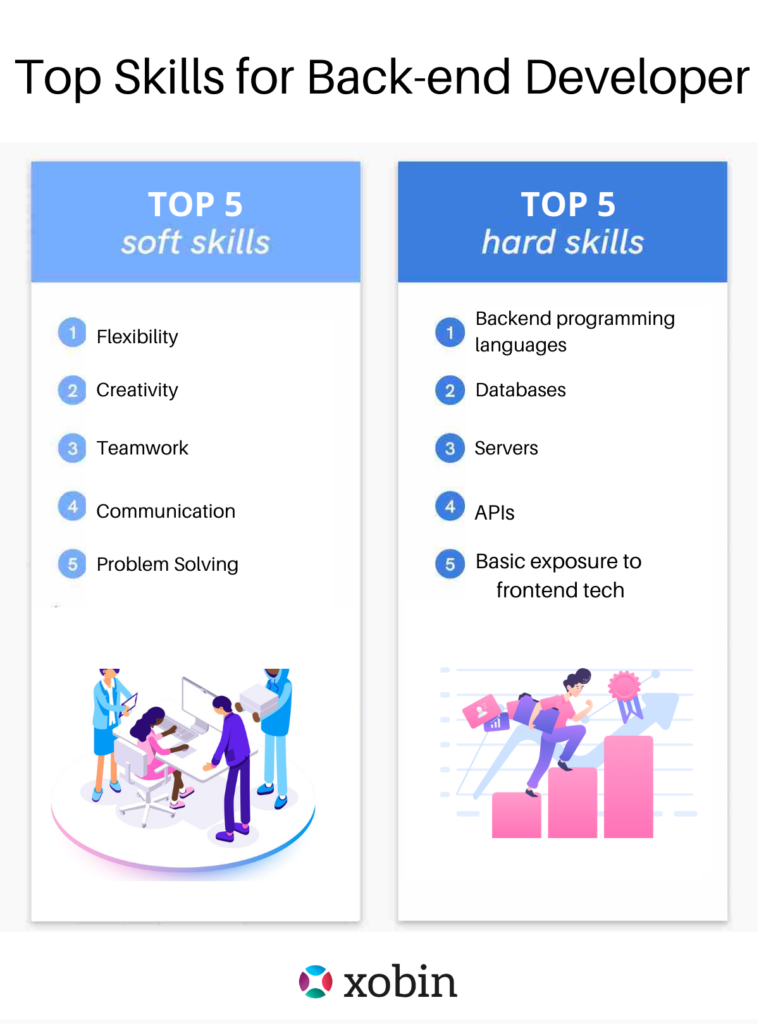Top Interview Questions for Back-end Developer
A Back-end developer is someone who builds and maintains the technology that powers the components which, collectively, enable the user-facing side of the website to exist. They are also responsible for building the structure of a software application.
The education requirement for a Back-end developer are:
- Bachelor’s degree in computer programming, or a related field.
- More qualification or experience may be required d
- Fluency of specific languages, such as Java, PHP, or Python, and operating systems may be required.
Are you in a hurry to get started? Download the Back-end Developer Interview Questions and Responses Toolkit.

Hard Skills
Use these questions to identify a candidate’s technical knowledge and abilities

Soft Skills
Use these questions to assess a candidate’s personality traits and cognitive skills
What to look for while interviewing for a Back-end Developer?
The skills required for a Back-end developer position are expertise in backend programming languages like Java, Ruby, API(REST & SOAP), and basic exposure to frontend techs. Therefore, look for a candidate who has knowledge of all these.
Here are some of the in-demand skills for a Back-end Developer

Role-specific skills to look for: Backend programming languages, databases, servers, APIs, and basic exposure to frontend techs.
Soft skills to look for: Creativity, flexibility, communication skills, problem-solving, and teamwork.
Pro Tip: Always screen before you interview. Use Online Assessment to screen applicants for a Back-end developer position before blocking your time for an in-person interview.
Questions to ask while interviewing a Back-end Developer
We have compiled a set of questions with the help of 70+ hiring managers at different organizations.

Top Role-based interview questions for Back-end Developer
What’s the difference between threads and processes?
Purpose of this interview question:
Questions like this are asked to test the foundational knowledge and specific competence of the candidates.
What to listen for:
- Listen for specific terms that differentiate between threads and processes.
Can you name some Performance Testing best practices?
Purpose of this interview question:
Testing and debugging are critical topics for a back-end developer job role.
What to listen for:
- Candidates must concisely explain the best practices of performance testing.
Can you compare SQL databases and MongoDB at a high level?
Purpose of this interview question:
As working with a database is one of the major skills required for a this developer, hence it is critical to the job role that a candidate can differentiate between SQL and MongoDB databases.
What to listen for:
- A top candidate would list out the various points to compare SQL and MongoDB databases.

How to screen Back-end Developer for soft skills?
Where do you see yourself in the next 5 years?
Purpose of this interview question:
This question is designed to understand the future goals and if that is relevant and realistic to the position.
What to listen for:
- Listen for the skills the candidate wants to develop and how would it help the company.
What are your salary expectations?
Purpose of this interview question:
This question is helps in understanding what the market is currently paying for certain qualifications, experience, and skills.
What to listen for:
- Top candidates would give the range of salary they expect.
Has there been a time when you received negative feedback?
Purpose of this interview question:
With this question, you can get to know about the candidate’s professionalism and how open-minded they are.
What to listen for:
- An ideal answer will provide detail of the circumstances, feedback, and approach to find a solution.

Start Optimizing your Back-end Developer Hiring today
Find and hire talent with confidence. If your candidate doesn’t know the answer to the above questions and you’re hiring for a Back-end Developer position, then they’re probably not a great fit.
Read our additional hiring guides









